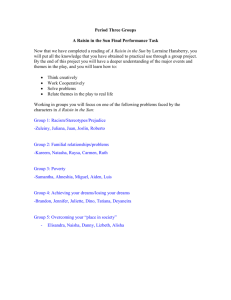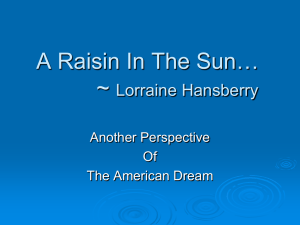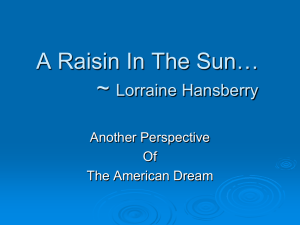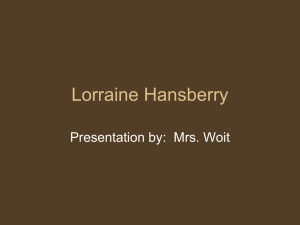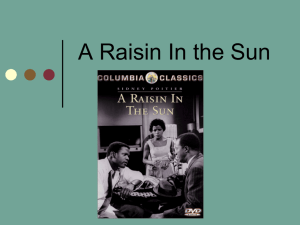A Raisin in the Sun
advertisement
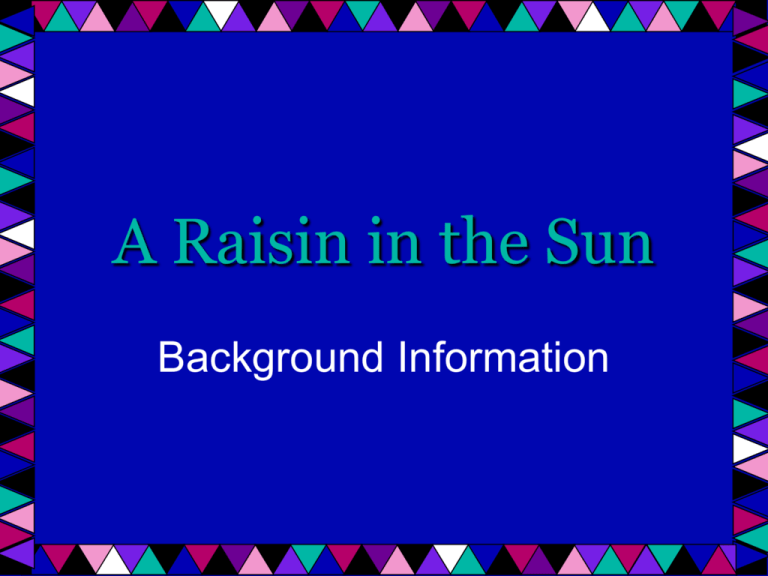
A Raisin in the Sun Background Information American Dream • What is it? • Is it an idea or does it involve material things? • Ethnic, social, economic implications “A Dream Deferred” What happens to a dream deferred? Does it dry up Like a raisin in the sun? Or fester like a sore-And then run? Does it stink like rotten meat? Or crust and sugar over-like a syrupy sweet? Maybe it just sags like a heavy load. Or does it explode? - Langston Hughes Performance Task A Note on the Title • Lorraine Hansberry took the title of A Raisin in the Sun from a line in Langston Hughes’s famous 1951 poem “Harlem.” • “Harlem” captures the tension between the need for black expression and the impossibility of that expression because of American society’s oppression of its black population. • In the poem, Hughes asks whether a “dream deferred”—a dream put on hold— withers up “like a raisin in the sun.” More on the title • His lines confront the racist and dehumanizing attitude prevalent in American society before the civil rights movement of the 1960s. • Hansberry’s reference to Hughes’s poem in her play’s title highlights the importance of dreams in A Raisin in the Sun and the struggle that her characters face to realize their individual dreams, a struggle tied to the more fundamental black dream of equality in America. Civil Rights Movement • What was the Civil Right Movement? • What was the goal of this movement? • Were there any other movements during the period? Social Background • Published in 1959, four years after Rosa Parks’ was arrested for refusing to give up her seat to a white person on a bus, sparking the Civil Rights Movement, Hansberry’s play illustrates black America’s struggle to gain equal access to opportunity and expression of cultural identity. Sentiments in A Raisin… will be echoed by MLK in later speeches, marches, and rallies Martin Luther King, Jr. Civil-Rights Leader 1929-1968 I have a dream… a dream deeply rooted in the American dream. I have a dream that one day this nation will rise up and live out the true meaning of its creed: ‘We hold these truths to be self-evident: that all men are created equal.’ Cont’d dreams represented in the play and later echoed by King • I have a dream that my four children will one day live in a nation where they will not be judged by the color of their skin but by the content of their character. • I have a dream…where little black boys and black girls will be able to join hands with little white boys and white girls and walk together as sisters and brothers. MLK • How does King help to develop the idea of the American Dream? • What does he do to the existing American Dream? Lorraine Hansberry • Born May 19, 1930 in Chicago • Died of cancer at the age of 34 • Daughter of a prominent realestate broker and the niece of a Harvard University professor of African history • A Raisin in the Sun - first play A Raisin in the Sun • Originally title “A Crystal Stair” from another Langston Hughes’ poem • First production in 1959 • Known as the "movin’ on up" morality play of the 1960s – Morality play - It uses allegorical characters to teach the audience moral lessons Plot Basics • explores the struggles of ordinary people to achieve their desires • the story of the Youngers, a Southside Chicago family trying to survive in cramped quarters. • When Mama gets a $10,000 check from her husband's life insurance, they consider moving to a larger house in a white suburb. Cast of Characters • Lena Younger (Mama) – God-fearing mother of Walter, refuses to give up in the face of adversity • Beneatha – Walter’s 26year-old sister, articulate and ambitious college student, hopes to become a physician • Walter Lee Younger – 35-year-old chauffeur who longs to improve himself to reap the same rewards that white people enjoy • Travis – Walter and Ruth’s son, friendly boy of 10 or 11 • Ruth – Walter’s humble and devoted wife • Mr. Lindner - white man who attempts to prevent the Youngers from moving into his neighborhood Cast of Characters • Joseph Agasai – cultured, well-spoken Nigerian who courts Beneatha • George Murchison – rich Chicagoan who also courts Beneatha • Bobo – Walter’s friend, they plan to open a liquor store • Willy – Walter and Bobo's business partner, runs off with Walter and Bobo's money (Willy has no speaking part in the play) • Furniture Mover – comes to the Youngers' apartment to move their belongings to their new house What is a theme? Themes • • • • • • Faith Family Compromise Evils of racial prejudice Money can’t buy happiness Importance of dreams What is a symbol? Symbols • • • • Mama’s plant Kitchen window Fifty cents, one dollar New House and garden
